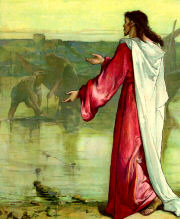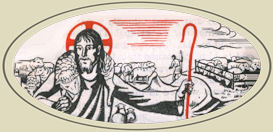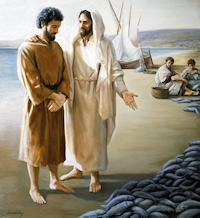» Enjoy our Liturgical Seasons series of e-books!
"When it was already dawn, Jesus was standing on the shore; but the disciples did not realize that it was Jesus." For the third time Jesus appears to His disciples and on the lake of Genesareth renews the miraculous draught of fishes. The Fathers did not fail to see in the one hundred and fifty-three great fishes that Peter brought to land the neophytes born to supernatural life in the waters of baptism and brought by Peter to the feet of the risen Christ.
Click here for commentary on the readings in the Extraordinary Form of the Roman Rite.
Sunday Readings
The first reading is taken from the Acts of the Apostles, 5:27-32, 40b-41. The Apostles' failure to obey the Sanhedrin is obviously not due to pride or to their not knowing their place; the Sanhedrin is imposing a ruling which would have them go against God's law and their own conscience.
The second reading is from the Book of Revelation, 5:11-14. The host of angels around the throne act as a kind of guard of honor proclaiming the sublime perfection of Christ the Lamb; they list seven attributes which all point to the fact that he has everything that belongs to the Godhead.
 The Gospel is from St. John, 21:1-19, The primary purpose in recounting this appearance of the Risen Christ to his Apostles, was to stress the actual conferring of the Primacy on Peter. From this very first meeting with Christ at the Jordan (Jn. 1:42) the Savior had told him that his name Simon bar-Jonah would be changed to Cephas, which means Rock. Some year or so later, at Caesarea Philippi, this change took place when Christ said to Simon, "You are (Peter) Rock. and upon this Rock I will build my Church . . . and I will give you the keys of the kingdom of heaven" (Matt. 16:18-19).
The Gospel is from St. John, 21:1-19, The primary purpose in recounting this appearance of the Risen Christ to his Apostles, was to stress the actual conferring of the Primacy on Peter. From this very first meeting with Christ at the Jordan (Jn. 1:42) the Savior had told him that his name Simon bar-Jonah would be changed to Cephas, which means Rock. Some year or so later, at Caesarea Philippi, this change took place when Christ said to Simon, "You are (Peter) Rock. and upon this Rock I will build my Church . . . and I will give you the keys of the kingdom of heaven" (Matt. 16:18-19).
This promise, that Simon would be the foundation, the source of strength and unity, in the new Christian community, was made factual on the occasion described here by John. Christ uses a new metaphor—Simon (Peter) is to be the new shepherd—he would take the place of Christ, as head and director of the Christian flock. He would provide protection and pasturage for Christ's sheep and lambs. He would, in other words, be the keeper and head of Christ's Church.
That this position of authority was recognized by his fellow Apostles and by the first Christians, is evident in almost every page of the Acts—the book which describes the infant Church. It was Peter who presided at the election of Matthias, who succeeded Judas in the apostolic college (Acts 1:15-26): he gave the first Christian sermon after the descent of the Holy Spirit (2: 14-40); he worked the first recorded miracle wrought by any Apostle (3:1-11); he pronounced sentence on Ananiah and Sapphira (5:1-11); it was he who received the first Gentile convert into the Church (11:1-18) and it was he who defended Paul's action at the Council of Jerusalem (15:6-11).
In face of such evidence no serious historian can doubt but that the other Apostles and the first Christians saw in Peter the living head of the Church, the representative of Christ. The Church in the succeeding generations and centuries saw the successor of Peter, and the living representative of Christ in the occupant of the See of Rome, the bishopric held by Peter, when he was martyred for the faith. History is witness to this.
There were Christians who refused obedience to him, but not one of them claimed for himself the privilege of Peter and his successors. That the Church, the society founded by Christ to bring salvation to the world, should need a visible Head on earth, needs no further (and has not stronger) proof than that Christ himself saw it as necessary and arranged it accordingly. The power of the keys, given to Peter, were more necessary in the second and succeeding generations than in Peter's day, when the other Apostles were still alive. When Christ laid the foundation of his Church on a Rock. it was to be a Rock that would last as long as the Church. Peter died, but Peter's office will last until the last man goes to heaven. The Sheep and the Lambs of the twentieth and thirtieth centuries have as much need of pasturage and protection as, if not more than, those of the first century. Christ, our Savior and our Good Shepherd, provided for all time.
Excepted from The Sunday Readings, Fr. Kevin O'Sullivan, O.F.M.
Commentary for the Readings in the Extraordinary Form:
Second Sunday after Easter
 "I am the Good Shepherd. . .I lay down My life for My sheep. . .but the hireling flees because he is a hireling, and has no concern for the sheep" (Gospel).
"I am the Good Shepherd. . .I lay down My life for My sheep. . .but the hireling flees because he is a hireling, and has no concern for the sheep" (Gospel).
Jesus organized the visible Church along the lines of a sheepfold. St. Peter, first shepherd of the visible Church, depicts Jesus as the invisible "Shepherd. . .of your souls" (Epistle). He tenderly remembers all that Jesus suffered for us "Sheep going astray."
On Catacomb walls, early Christians delighted to draw pictures and to wrote explanations of the perfect understanding and love between the Good Shepherd and His sheep, such as that which exists between the "Father" and "Me."
We are not only fed through the visible guidance of His Church, but also through the invisible grace of the Sacraments, especially "in the breaking of bread" (Alleluia Verse).
Excerpted from My Sunday Missal, Confraternity of the Precious Blood
Meditation for the Third Sunday of Easter
On the road to Emmaus: Jesus, alive and at our side
The Gospel of today’s Mass presents us with another appearance of Jesus on the evening of his Resurrection. Two disciples are making their way to the village of Emmaus, having lost all hope because Christ, in whom they had placed the whole meaning of their lives, was dead. Our Lord catches up with them, as if He too were just another traveler on the road, and walks with them without being recognized. They engage in broken conversation, as happens when people talk as they are going along. They speak about their preoccupation: what has happened in Jerusalem on the Friday evening—the death of Jesus of Nazareth. The Crucifixion of Our Lord had been a very severe test for the hopes of all those who considered themselves to be his disciples and who to some extent or another had placed their trust in him. Things had all taken place very quickly and they still hadn’t got over all they had seen with their very eyes.
These men who are returning to their home village after having celebrated the Paschal feast in Jerusalem show by the tone of their conversation their great sadness and how discouraged and disconcerted they are: We had hoped that he was the one to redeem Israel. But now they speak of Jesus as a reality belonging to the past:
Concerning Jesus of Nazareth, who was a prophet mighty in deed…Notice the contrast. They say ‘who was!’…And He is there by their side. He is walking with them, in their company, trying to uncover the reason, the most intimate roots of their sadness!’Who was!’, they say. We too, if only we would examine ourselves sincerely, with an attentive examination of our sadness, our discouragement, our being a little tired of life, would find a clear link with this Gospel passage. We would discover how we spontaneously remark ‘Jesus was’, ‘Jesus said’, because we forget that, just as one the road to Emmaus, Jesus is alive and by our side at this very moment. This is a discovery which enlivens our faith and revives our hope, a finding that points to Jesus as a joy that is ever present: Jesus is, Jesus prefers, Jesus says, Jesus commands now at this very moment (A. G. Dorronsoro, God and People)
Jesus lives.
These men did know about Christ’s promise of rising on the third day. They had heard that morning the message of the women who had seen the empty tomb and the angels. Things had been sufficiently clear for them to have nourished their faith and their hope; but instead, they speak of Christ as belonging to the past, as a lost opportunity. They are a living picture of discouragement. Their minds are in darkness and their hearts are numbed.
Christ Himself—whom they did not at first recognize but whose company and conversation they accept—interprets those events for them in the light of the Scriptures. Patiently He restores in them their faith and their hope. And the two of them recover also their joy and their love: Did not our hearts burn within us, they say later, while he talked to us on the road, while he opened to us the scriptures?
It is possible that we too may sometimes meet with discouragement and lack of hope because of defects that we cannot manage to root out, or of difficulties in the apostolate or in our work that seem to be insurmountable…. On these occasions, provided we allow ourselves to be helped, Jesus will not allow us to be parted from him. Perhaps it will be in spiritual direction, once we open our souls in all sincerity, that we will come to see Our Lord again. And with him there will always come joy and the desire to begin again as soon as possible: And they rose that same hour and returned to Jerusalem. But it is essential that we allow ourselves to be helped, and that we are ready to be docile to the advice that we receive.
—Francis Fernandez, In Conversation with God, Daily Meditations Volume Two: Lent-Holy Week-Eastertide






